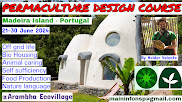Permaculture Introduction Course
PIC
PIC
The PIC is a introduction to how can we think and act the same way as nature does, providing practical solutions to the global crises we are currently facing.
Permaculture is a sustainable design system that provides for human needs while having positive effects on the surrounding environment.
How can i design my farm, my garden or my house so that i become more self sufficient?
How can i get more connected with nature and understand how it works?
How can i get more connected with nature and understand how it works?
In what way can i save energy on everything i do?
How can i recover and redesign areas or objects in a way that they become more ecological and nature friendly?
How can i live a more healthy life without having to buy so many chemical products?
How can i develop or be part of a network of people that is inspired to be of positive change to this world?
Did you ever found your self having this ideas?
I want to develop design skills and find a new way of thinking.
I want to support other people to find a way to live a low impact lifestyle
I would like to be living connected with nature working the same way it works.
I see myself living with a community that works toguether.
I want to recover an old farm and live with what it can produce.
On this course we will answer these questions and will support these ideas
The PIC is the course that most supports the intuitive permaculturists, many people practice permaculture in an intuitive way with wonderfull results, on this course we learn about the thinking of permaculture, the way we look at things, so this course has the objective of changing the way we look at the world, thats why for many people its a life changing experience.
Between 2 and 5 days we look at the story of permaculture, were it comes from and were it is going, we share the alternative ways of presenting knowledge of the new school permaculture, there is a focus to start to create the community that will live toguether until the end of the course, this is all part of the introduction to social permaculture that we cover on the early days of the course.
It is important from the beginning of the course that students understand the ethics and principles of permaculture and how ecosystems work, so we develop skills reading the landscapes, and understanding climates and microclimates on the context of natural patterns and successions .
Building soil and soil consciousness its the base for regenerating ecosystems, thats were we move our focus wen we want to learn about creating abundant stable gardens or forests, independent of being on a urban or rural context.
We talk about land regeneration with soil building and proper water retention and management, the secrets of living water and how to regenerate deserts.
The PIC is a wonderfull course for people that like to work with plants and animals, living material as we call it, during these days we dive deep on garden design and landscaping, companion planting, food forests and animal care, we hope that by the end of this course people can design gardens and farms on the permaculture way.
One of our big goals is that our students understand and practice this new way of thinking, the way of nature, so we focus on exercises about sistemic thinking and ecological dynamics so that we can get the goals of creating a change of attitude of the way people see everything around .
The PIC its a design course so the main focus is on developing some skills in a way that students can apply sustainable strategies to the places they go.
To know more about some of the content of the PIC you can check:
Bill Mollison Curriculum HERE
British Permaculture Curriculum HERE
Some of the subjects covered during the PIC include:
The ethics and principles of Permaculture
Learning strategies
Educational Methods
Reading the landscape
Pattern in design
Biodiversity
Water preservation
Forest and trees
Garden Desin
Urban strategies
Garden Desin
Urban strategies
Soils building
Buildings and natural construction
Community development
Climates
Alternative economies
Information contact:
maininfonsp@gmail.com






















